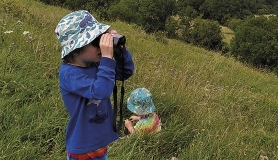From early on in my eldest son’s life, I started to explore the idea of home education. During his early years I read countless parenting books in an effort to get my bearings. Amongst these stacks of books I discovered John Holt, a guiding voice of reason and reassurance for a growing body of people who educate their children at home and within the community. This educational thinker spent enormous amounts of time gently watching the children in his life and the ways in which they learnt. Through these observations he came to the conclusion that they largely learn best when left alone. While this is an obviously controversial position to adopt, as the world seems determined that children can only succeed by spending many years in an educational institution, I could not dismiss it. For me, there were startling truths in this man’s affectionate observations.
Growing conviction I have some experience of the education system having worked in secondary schools as a learning mentor for a number of years. When I reflected on my time spent working with young people in schools it only strengthened the growing conviction I had that mass education for all is not always as beneficial or essential as we’re led to believe. There are of course many laudable things about the ideal of universal education and in most cases children survive their school experience. But it is an unavoidable fact that educating in such large numbers and pushing to achieve meaningless and ever higher results often leaves individual passions unnurtured. Although the system would have us believe that one size fits all, in reality this is rarely true. I also came to believe that if some of us are seeking a fairer and more sustainable society, with less consumerist and more egalitarian values, we need to live those ideals in the big choices we make. Living more closely as families and communities, having a greater and more meaningful connection with the natural world, learning from living – in joy and at our own pace, seem to me to be ideals worth pursuing. With all these things in mind and a strong belief in our children’s own capacity for self-directed learning, my partner and I gradually came to the certainty that we would trust John Holt’s vision of “unschooling” as a choice for our family.
Taking the plunge Despite our research and instinctive pull towards a freer education, when it came our time to make the leap to full-time home education after a brief stint at the local Steiner kindergarten, I was momentarily nervous. I discovered that it’s one thing to read about how children will learn without school and quite another to hold your nerve and let them do it. At this point in time state education is often criticised but rarely rejected. It is still the case that almost everyone sends their children to school; it’s taken for granted and rarely do families even contemplate the alternatives. The general consensus seems to be that while school may not be an ideal option, it is the safest. This makes it more than a little scary when it comes to the time to home educate your own children. I had so many questions and really no way to get answers will they really be able to learn independently? Will we cope being together all the time? Will my child, as society would have us believe, be “missing out”? Will he ever learn to read? I concluded that we would never really know until we just took the plunge and did it.
Learning naturally The idea of unschooling, or selfdirected learning, is that, apart from support and facillitation, there is no direct teaching done with the child. By simply living and discovering on their own terms, children will learn what they desire to learn, giving them complete ownership of their own education. It has been with great relief that I have come to realise that John Holt and his followers in the unschooling movement seem to have it right; children really do learn as naturally as breathing. Watching my son learn and grow on his terms has been truly magical and has made me wonder about the validity and necessity of a great deal of “teaching”. Generations of living within a system that tells us children can only really learn in school means that we have collectively forgotten just how organic learning can happen. After an initial brief period of wondering if we were “doing” enough, our family has settled into an unstructured and fairly free-form pattern of being. From the outside it might possibly look as if not much is really happening, but nothing could be further from the truth. The instinctive learning I have witnessed is natural and should be unremarkable, but having taken a leap of faith I have watched with fascination the miracle of my son’s self-education.
Leaps of discovery Although much of the learning that goes on is gradual and cumulative there are reassuring and quite amazing ‘leaps of discovery’. These precious moments have come when least expected; reading started when my son put three letters together over breakfast and worked out that they made a word, then he read another and another and has slowly and haltingly built on this. Without prompting or overt encouragement, one day he began writing and completed two pages of phonetically spelled story when only odd words and scribbles had come before. Another significant learning milestone occurred when at the table again, he held up fingers and announced with wonder ‘two and two are four!’. All these revelatory moments are home educating gold – the living proof that self-directed discovery can and does happen. Watching him working things out for himself, when the interest and the developmental stage merge, is nothing short of miraculous. And the greatest magic is witnessing the pride and wonder, the sheer joy on his face when he makes these leaps; on the day I could read words he had himself put onto paper, he looked as if he alone possessed the secret of joy.
These “discoveries” are nothing more than the product of the slow and steady assimilation of knowledge he gathers daily from the world around him. Nevertheless they serve to give me the confirmation I need that children do indeed work things out for themselves, given the right space and support. Choosing a path less travelled can be daunting. Wondering whether you’re doing the “right” thing does crop up when you hear other parents and children talking about school. Some people might respond to these achievements by pointing out that children in school are way ahead of these basic skills, but for the home educator when our children master these things is not important; it is how they do it that counts. The feelings are similar to those I felt when they first walked or spoke a clear word. However, I don’t believe these overt learning milestones are any more valuable than watching my children mess about on a riverside for hours on end, play an involved imaginative game with their best friend, free-wheel their bike down a big hill, or simply hang about dreaming and being still. I don’t choose to home educate just so that I can get “results” by another means, I choose to home educate because I want to give my son the freedom to explore the world in a way that feels right for him, I want to empower him to realise that learning is a joyful and life-long journey and I want to believe that a society that honours diversity, flexibility and connection is possible.
Promoting Self Directed Learning
Cafi Cohen, unschooling mother and author of Homeschooling: The Teen Years shares ways to support your self directed learner.
1 Encourage and support any self-directed activity. It may or may not look “academic”. Examples from our house include drawing, reading, hiking, cooking and baking, planning meals, corresponding via e-mail, caring for pets, fixing things around the house, and cycling.
2 Get rid of, turn off, or restrict TV and mindless video games.
3 Be a facilitator, not a fulltime teacher. Help your homeschoolers follow up on their wonderings. Consider community resources. Our son studied electronics with the local amateur radio group.
4 Create a rich home learning environment. Accumulate books and magazines, movies and documentaries, tools, art supplies, musical instruments, etc.
5 Involve children in family “adult” activities and decisions; and (here’s the hard part) take your child’s comments and suggestions seriously. Do they have ideas for meals, pet care, house improvements, the budget? Take advantage of the creative potential of homegrown brain power.
6 Model self-directed learning. Pursue your interests to become a lifelong learner. Take classes, join community groups, and teach yourself. Your children will see a daily example and absorb that.
Want to know more? selfdirectedlearning.com is a brilliant site for adults and older children on discovering your self directed learning genius. The activities are well worth a browse.
What to read: How Children Learn John Holt Learning Without School Ross Mountney The Self Propelled Advantage Joanne Calderwood
Selina is a nature loving, home educating, amateur forager and sporadic blogger. She spends lots of time outdoors with her camera and two boys. Read her blog at themuckyroot.blogspot.co.uk







